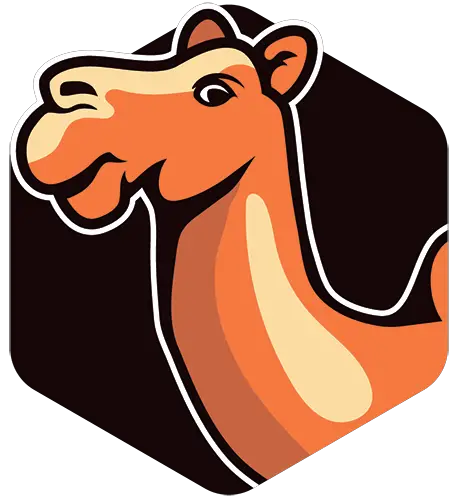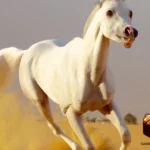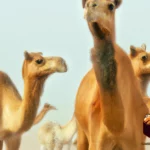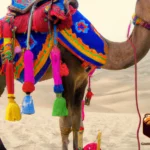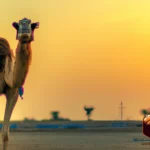Captive camels require a well-balanced diet to maintain their health and well-being. However, giving them the appropriate food can be a challenge for many keepers. It is crucial to understand what a camel’s body requires to optimize their physical, behavioral, and reproductive health. To ensure that a camel receives a healthy diet, it is important to consider different factors such as forage, hay, supplements, vegetables, fruits, grains, and water. Besides, determining the right portion control and feeding frequency is crucial. In this article, we will explore the steps you can take to provide a balanced diet and feeding practice for captive camels.
Contents
Why a balanced diet is important for captive camels
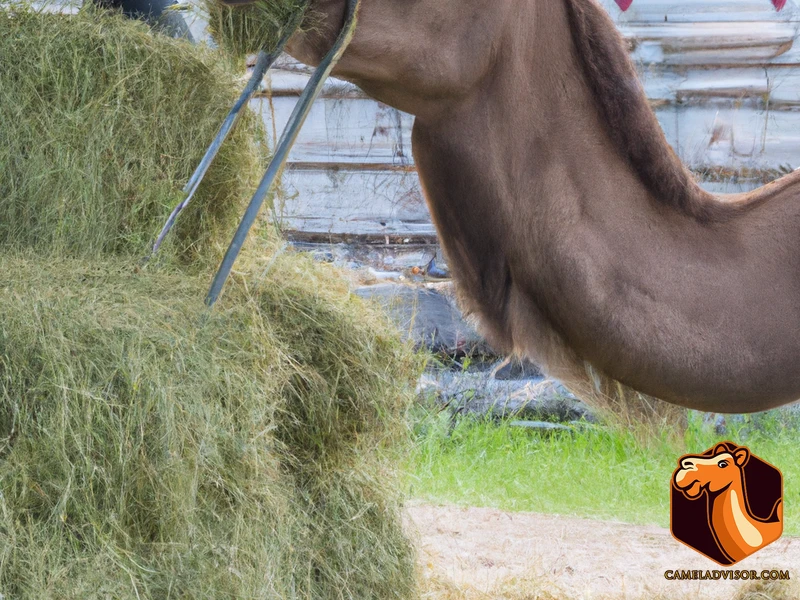
Camels are fascinating animals that require a well-balanced diet to thrive in captivity. Feeding them an unbalanced diet can lead to various health issues and behavioral changes that hamper their ability to reproduce and perform at their best. Hence feeding them a balanced diet is important. In this article, we will discuss the reasons why a balanced diet is crucial for captive camels, what to include in their diet, and how to control their portions and feeding frequency. Keep reading to find out more about the significance of a balanced diet for camels in captivity.
Camel health
A balanced diet is important for captive camels to maintain their health, and ensuring that they receive proper nutrition is essential in preventing various health conditions. Providing a balanced diet can help prevent diseases such as osteoporosis, rickets, and scurvy. Camels require a combination of roughage, protein, minerals, and vitamins to remain healthy.
Forage: Camels are herbivores and require a diet high in forage, such as grasses, leaves, and shrubs. Feeding camels a forage diet promotes good digestive health and helps prevent digestive diseases.
Hay: Good quality hay should also be part of a camel’s diet, as it contains essential nutrients such as fiber and protein. Camels should be fed hay that is free from mildew, mold, and dust.
Supplements: Camel diets may require supplements in order to meet their nutritional needs, such as calcium and phosphorus. Commercial camel feeds and supplements can be used to ensure they are consuming the appropriate balance of vitamins and minerals.
Vegetables and fruits: Fresh vegetables and fruits should also be included in a camel’s diet for additional minerals, vitamins and fiber. However, it is important to limit the amount of fruits, as they contain a high amount of sugar.
Grains: Grains should be fed in small amounts if necessary or if recommended by a veterinarian or animal nutritionist. However, feeding grains in excess can lead to various health problems, including obesity and digestive distress.
Water: Adequate water should always be provided to camels as they require a significant amount – up to 30 liters per day – to remain healthy. Access to clean and fresh water should be available at all times.
A balanced diet is crucial for the health and wellbeing of captive camels. Providing a diet high in forage, supplemented with hay, essential nutrients, fresh vegetables and fruits, as well as appropriate portion control, and access to clean water can help prevent digestive diseases, deficiencies, and other health conditions. Camels’ nutritional needs can vary widely based on factors such as age, sex, and reproduction, and it is important to work with a veterinarian or animal nutritionist to ensure individual camel’s needs are being met.
Behavioral issues
Camels are social animals that thrive on social interaction, playtime, and mental stimulation. Captive camels that do not receive a balanced diet may display behavioral issues such as aggression, lethargy, and lack of interest in their surroundings. A proper diet helps to prevent these issues and ensure a healthy, happy camel.
Tooth problems: Improper diet can cause tooth problems in camels, which can lead to difficulty eating and, in turn, irritability and aggression. These issues can be prevented with a balanced diet that includes forage, hay, and supplements to meet the camel’s nutritional needs.
Lack of energy: A lack of energy is a common issue among camels that are not receiving a balanced diet. This can cause lethargy, low energy levels, and a general lack of interest in their surroundings. Proper feeding practices, including portion control and feeding frequency, can help prevent this issue.
Stress: Captive camels that are not receiving a balanced diet can experience increased levels of stress. Stress can lead to a variety of behavioral issues, including aggression and anxiety. Proper nutrition can help reduce stress levels and ensure a stable temperament.
Reduced playtime: Camels need social interaction and playtime to keep their minds active and engaged. A lack of proper nutrition can cause lethargy and reduced playtime, which can lead to boredom and further behavioral issues. A balanced diet can help ensure that camels have the energy and mental stimulation they need to engage in play and social interaction.
In order to maintain good health and prevent behavioral issues in captive camels, it is important to provide a well-balanced diet that meets their nutritional needs. This includes a combination of forage, hay, supplements, vegetables and fruits, grains, and water. By implementing proper feeding practices and providing a balanced diet, owners can ensure that their camels live happy and healthy lives.
Reproductive success
Camels that are provided with a balanced diet are more likely to have successful reproductive outcomes. Both male and female camels require a nutritious and well-balanced diet to maintain reproductive health. Males need sufficient nutrients to produce high-quality semen, while females need a healthy diet to support pregnancy, lactation, and the growth of their calves.
Nutrition impacts fertility: Proper nutrition for camels is crucial for reproductive success. Nutritional deficiencies or imbalances in a camel’s diet can result in poor semen quality, poor ovulation rates, and even infertility. A balanced diet rich in fiber, protein, and vitamins is essential for the reproductive health of camels.
Camel pregnancy: Pregnant camels have increased nutritional requirements as they must support the growth and development of their fetus. Feeding them a diet rich in fiber, vitamins, and minerals is essential for the health of both the mother and the calf. Camels who are underfed during pregnancy may produce small, weak, or malnourished calves.
Lactation: Lactating camels require more nutrients to produce sufficient milk for their young. Nutrition imbalances during this period can lead to suboptimal milk production and low weight gain in the calf. It is essential to feed lactating camels with nutritious foods to ensure their young grow up strong and healthy.
Bone health: Proper nutrition is also essential for maintaining bone health for the mothers and the calfs. If a mother camel’s diet is inadequate, it can lead to calcium and phosphorus deficiencies, which can result in bone weakness and fractures. The diet should be monitored and adjusted accordingly to prevent any bone problems.
Ensuring a balanced diet for captive camels is essential for their proper reproductive health. Proper nutrition can result in healthy offspring, improved fertility rates, and successful breeding programs. For more information on the benefits and drawbacks of feeding camels salt and the impact of diet on bone health, check out this link and this link respectively.
Reduced stress
A balanced diet for captive camels not only affects their physical health and reproductive success but also helps in reducing stress. A good diet can make a camel more resilient and better able to handle changes in their environment. Stress is a major factor in the health and welfare of animals, and it is important to minimize it as much as possible.
Stress can lead to behavioral issues, such as aggression, nervousness, and a lack of appetite. It can also lead to physical health problems such as ulcers, diarrhea, and even death. Providing a balanced diet can help reduce the likelihood of stress in captive camels.
To reduce stress in captive camels, it is important to feed them a variety of foods that meet their nutritional needs. This includes forage, hay, supplements, vegetables and fruits, grains, and water. Each of these food groups plays an important role in the camel’s health and wellbeing.
For example, forage contains fiber which is essential for proper digestion. A diet that is high in fiber helps prevent digestive problems that can cause stress. Hay is important for keeping the camel’s teeth healthy and preventing boredom which can lead to stress.
Providing a variety of fruits and vegetables can also help reduce stress in captive camels because they add variety to their diet and provide important vitamins and nutrients. Supplements are also important for ensuring that the camel’s diet is balanced and deficient in any vital nutrients.
Finally, it is important to ensure that camels are not overfed, as overfeeding can lead to health issues and stress. Proper feeding practices, including portion control and feeding frequency, can help reduce the likelihood of overfeeding and keep the camel healthy and stress-free.
What to include in a camel’s diet
When it comes to ensuring the good health and well-being of captive camels, a balanced diet is of utmost importance. However, developing a balanced diet for camels is not always straightforward as their dietary needs can vary depending on factors such as age, reproductive status, and activity level. It is essential to know what to include in a camel’s diet to ensure they get the necessary nutrients to thrive. In this section, we will discuss the various components that make up a healthy and balanced diet for captive camels. We will cover forage, hay, supplements, vegetables and fruits, grains, and water. It is essential to keep these elements in mind when creating a diet for camels. Additionally, understanding the appropriate portion sizes and frequency for feeding is equally crucial.
Forage
Forage is an important part of a captive camel’s diet. It refers to the vegetation that camels graze on naturally in the wild. Forage is rich in nutrients that are essential for camel’s health and wellbeing.
Types of Forage:
Camels consume various types of vegetation as forage when grazing in the wild. Some of the common ones are:
- Shrubs: Camels feed on different types of shrubs. Some examples include acacia, tamarisk, and saltbush. Shrubs are a great source of fiber and protein which helps in maintaining a camel’s digestive system.
- Grasses: Camels feed on different varieties of grasses such as barley grass, rye grass, and fescue grass. Consuming grasses ensures that the camel receives the necessary vitamins and minerals that are needed for a healthy body.
- Trees: Camels also consume tree leaves and bark. Acacia, for example, is a tree that has leaves that are highly nutritious for camels. This type of forage is a healthy source of carbohydrates and proteins.
It is important to ensure that captive camels receive lots of forage to overcome the absence of grazing opportunities. The forage will provide the required fibre, minerals, and nutrients necessary to meet the camel’s dietary needs. However, the amount of forage required may depend on several factors such as the age, weight and level of activity of the camel.
To Sum Up, forage is an important part of a camel’s diet and should be fed to them regularly to maintain their health. Variety in forage is also important to ensure that camels get a balance of nutrients, minerals and vitamins they require.
Link to learn more about Fiber Diet in Camels: /fiber-diet-camels/
Hay
Hay is an essential part of a camel’s diet, providing necessary fiber and roughage. It should make up the majority of the camel’s diet, typically around 70%. This high fiber content helps regulate digestion and prevent constipation or digestive issues.
There are several types of hay that are safe for camels to consume, including timothy, alfalfa, and grass hays. Alfalfa hay is often used in combination with other hays because of its high protein content. However, camels don’t require as much protein as other livestock and too much protein can actually be harmful to them. (source) It’s important to balance the amount of each type of hay to ensure the camel is receiving adequate nutrition.
Hay should be of good quality and free from mold and dust. It’s recommended that camels consume 1.5-2% of their body weight in hay daily. This can be fed in several smaller portions throughout the day to promote digestion and prevent overeating.
It’s also important to note that the nutritional value of hay can vary depending on several factors, including the time of year it was harvested and the maturity of the plant. It’s important to have the hay tested and analyzed to determine its nutritional value and adjust the camel’s diet accordingly.
In cases where hay is not readily available or of poor quality, alternative forages such as chopped vegetables, silage, or hay cubes can be used as a substitute. However, these should not replace hay entirely as it is the most important component of a camel’s diet. (source)
Hay is a crucial component of a camel’s diet, and should make up the majority of their intake. It provides necessary fiber and roughage to regulate digestion and prevent digestive issues. A balanced diet of different types of hay is needed, and it should be of good quality and free from mold and dust. Feed should be based on the camel’s weight, and hay should make up 70% of their diet. Additionally, it’s important to have hay tested to ensure it meets the camel’s nutritional requirements. (source)
Supplements
Supplements can play an important role in ensuring that captive camels are receiving a balanced diet. While forage, hay, vegetables and fruits, and grains are all important components of a camel’s diet, some nutrients may be lacking or need to be increased based on the camel’s individual needs.
Minerals: Supplements of minerals like calcium, phosphorus, and magnesium can be beneficial for camels. Calcium is important for bone health, while phosphorus plays a role in metabolic processes throughout the body. Magnesium is important for muscle and nerve function.
Vitamins: Vitamins are essential for a camel’s overall health and well-being. Vitamin A helps with vision, growth, and reproduction, while vitamin D is important for bone health. Camel owners should also consider providing vitamin E, which plays a role in the immune system, and vitamin B12, which is important for nerve function.
Probiotics: Probiotics are beneficial bacteria that can help improve digestion and promote overall gut health in camels. This can help reduce the risk of complications like colic and abdominal discomfort.
It’s important to note that supplements should not replace a balanced diet of forage, hay, vegetables and fruits, and grains. Instead, they should be used to fill in nutritional gaps or address individual needs. Additionally, supplements should be used under the guidance of a veterinarian or animal nutritionist.
Pregnant or lactating camels may have increased nutritional needs, and supplements may be helpful in ensuring they receive the necessary nutrients for themselves and their offspring.
Supplements can be a helpful addition to a camel’s diet, but should be used appropriately and not in place of a balanced diet. Access to clean water is also important for a camel’s health and digestion.
Vegetables and fruits
Camels should be given a variety of vegetables and fruits as part of their balanced diet. These foods provide essential vitamins and nutrients that are not found in other feed sources. Some great options to consider include:
- Carrots: These tasty vegetables are a great source of beta-carotene, which is important for maintaining healthy eyesight.
- Apples: Camels love the crunch of apples and they are high in fiber and vitamin C.
- Bananas: These fruits are a good source of potassium and can help keep a camel’s digestive system healthy.
- Sweet potatoes: These root vegetables are packed with vitamins and minerals, including beta-carotene and vitamin E.
- Spinach: This leafy green is high in iron, which is important for maintaining healthy blood cells.
- Watermelon: This juicy fruit is a great source of hydration and also provides vitamin C and potassium.
It is important to offer a variety of vegetables and fruits to camels to ensure they receive a wide range of nutrients. However, it is also important to remember that fruits can be high in sugar and should be given in moderation as a treat rather than a primary food source. As with any new food introduced into a camel’s diet, it is important to do so gradually and monitor their reaction to prevent any digestive issues.
Grains
When considering a balanced diet for captive camels, grains can also play an important role in their nutrition. Grains are a rich source of energy, which is a vital component in a camel’s diet. However, it’s important to note that grains should only make up a small portion of their overall food intake.
Some commonly used grains for camels include corn, barley, and oats. These grains should be thoroughly cleaned and processed before being fed to the camels. It’s recommended to feed grains in smaller quantities, usually no more than 1-2 lbs per day.
Here is a breakdown of the nutritional value of some commonly used grains for camels:
| Grain | Crude Protein | Crude Fat | Fiber | Energy (per 1kg) |
|---|---|---|---|---|
| Corn | 9-10% | 3-5% | 2-3% | 3,400 kcal |
| Barley | 11-13% | 2-4% | 4-5% | 3,200 kcal |
| Oats | 11-14% | 5-7% | 8-10% | 3,000 kcal |
It’s important to note that while grains provide a vital source of energy, they should not be the main component of a camel’s diet. A balanced diet for a captive camel should consist of a variety of forage, hay, supplements, vegetables, and fruits to ensure they receive all the necessary nutrients and minerals for optimal health.
Water
Water is an essential component of a camel’s diet as it helps in digestion, regulates body temperature and keeps the body hydrated. Camels have a natural ability to conserve water but they still need access to fresh and clean water at all times. Here are some important points to consider when it comes to providing water for captive camels:
- Source: It is important to provide high-quality water that is free from contaminants and pathogens. The water source should be regularly tested for pH levels, minerals, and other impurities that can affect the camel’s health.
- Availability: Camels need access to water at all times. They can drink up to 30 gallons of water in one sitting and can go without water for several days. Providing multiple sources of water in different locations can help ensure that all the camels have access to water even if one source runs dry.
- Temperature: Camels prefer to drink water that is at room temperature or slightly warm. Cold water can cause shock to their digestive system and may lead to health problems. In hot weather, it is important to provide shaded areas where the water can be kept cool.
- Monitoring: Camels may drink less water if they are not feeling well or if they are stressed. Monitoring their water intake can help detect health issues early on.
Providing fresh, clean and easily accessible water is crucial to maintaining the health and well-being of captive camels. It is important to consider the quality of water, availability, temperature, and monitoring of water intake.
Portion control and feeding frequency
Determining the appropriate amount of food to provide for captive camels can be challenging. It is crucial to provide a sufficient amount of nutrients while avoiding overfeeding to prevent obesity and associated health problems. Feeding frequency also plays a vital role in maintaining a balanced diet for these animals. Let’s explore the various factors that affect portion control and feeding frequency for captive camels.
Factors that affect portion control
Portion control is an essential part of ensuring a balanced diet for captive camels. Many factors affect the amount of food a camel requires. Here are some of the factors that affect portion control:
| Factor | Description |
|---|---|
| Age | Young camels require smaller portions compared to adults. Older camels may have reduced appetites and require smaller portions. |
| Weight | Heavier camels require larger portions compared to lighter camels. It is important to monitor a camel’s weight and adjust portion sizes accordingly. |
| Activity level | A more active camel will require larger portions compared to a less active camel. |
| Physiological state | Pregnant or lactating camels will require larger portions compared to non-reproductive camels. Sick or injured camels may require smaller or more frequent portions depending on their condition. |
| Diet composition | The type of food and proportion of each nutrient in a camel’s diet will affect its appetite and digestion. Some foods may be more satiating and require smaller portions, while others may be less filling and require larger portions to meet nutrient requirements. |
| Environmental factors | The temperature, humidity, and altitude of a camel’s environment can affect its appetite and metabolism. Camels require more water and electrolytes in hot and dry conditions, which can affect their food intake and portion sizes. |
Taking these factors into consideration when determining portion sizes can help ensure that captive camels receive a balanced diet and stay healthy.
Feeding frequency
It is important to establish a feeding schedule for captive camels to make sure they receive the right amount of nutrients every day. Feeding frequency is a crucial aspect of a balanced diet for camels. Here are some things to keep in mind when it comes to feeding frequency:
- The age and weight of the camel: Younger and smaller camels require more frequent feeding.
- Activity level: Camels that are more active will require more feedings than those that are sedentary.
- Seasons: During the winter months, the camel’s metabolism slows down, so they may require fewer feedings compared to the summer months.
- Type of feed: Different feeds have different digestion rates. For example, hay can take longer to digest in a camel’s stomach compared to fruits and vegetables. This will affect how often the camel needs to be fed.
Generally, adult camels should be fed twice a day, while younger camels may need to be fed three to four times a day. It is important to establish a feeding routine and stick to it as much as possible. Camels have sensitive digestive systems, and a sudden change in feeding frequency can result in health issues such as colic.
It is also important to monitor the camel’s feeding behavior. If a camel has difficulty consuming the food or appears to be struggling, it may indicate that the feedings need to be adjusted. On the other hand, if the camel is still hungry after a feeding, it might be necessary to increase the number of feedings or the volume of feed at each feeding.
When to feed
Feeding time is crucial to maintaining a balanced diet for captive camels. Camel owners should ensure they feed their camels often enough to meet their daily nutritional needs. Generally speaking, camels should eat at least twice daily, with one feeding in the morning and another in the evening. However, the frequency and timing of feedings can depend on several factors, such as the camel’s age, activity level, and overall health.
For example, younger camels require more frequent feedings than older camels, typically every three to four hours. Pregnant or lactating camels also need more frequent feedings to support their increased energy and nutrient requirements. Camels that are working or exercising more often may also require additional feedings to maintain their energy levels.
When feeding partially domesticated camels, it is important to also consider their natural behavior. In the wild, camels graze for multiple hours daily, so allocating a portion of the day to grazing is favorable. Owners may also choose to feed their camels before work or exercise when they are the hungriest and most likely to eat enough food.
Additionally, it is essential to consider the temperature and weather conditions when determining feeding times. Camels may eat less during the hottest parts of the day, preferring to eat in the morning or evening when temperatures are cooler. Owners can use shade or cooling systems to reduce the chances of heat stress and facilitate eating during extreme temperature events.
By following a regular feeding schedule that considers the unique nutritional needs and behaviors of captive camels, owners can ensure that their camels maintain a healthy, balanced diet.
Conclusion
In conclusion, a balanced diet is crucial for the health and well-being of captive camels. Including forage, hay, supplements, vegetables and fruits, grains, and water in their diet ensures that all their nutrient requirements are met. Portion control and feeding frequency should also be carefully monitored to avoid overfeeding or underfeeding, which can lead to health problems and behavioral issues.
It is important to consider individual factors such as age, weight, and activity level when determining an appropriate diet for each camel. Consultation with a veterinarian or animal nutritionist can also be beneficial in creating a balanced diet plan.
Overall, providing proper nutrition for captive camels not only improves their physical health but also benefits their behavior, reproductive success, and overall well-being. Regular monitoring and modification of their diet as needed can ensure that they live a long and healthy life in captivity.
Frequently Asked Questions
Question 1?
What can happen if a captive camel does not have a balanced diet?
Answer:
If a captive camel does not have a balanced diet it can lead to health problems such as obesity or malnutrition, behavioral issues, and reproductive failure.
Question 2?
What are some common health issues caused by an imbalanced diet in camels?
Answer:
Some of the common health issues caused by an imbalanced diet in camels include bloating, diarrhea, colic, laminitis, and vitamin deficiencies.
Question 3?
What kind of forage do camels eat in the wild?
Answer:
Camels in the wild usually eat dried grasses, shrubs, and tree leaves.
Question 4?
Why are supplements important in a captive camel’s diet?
Answer:
Supplements are important in a captive camel’s diet because they provide essential vitamins and minerals that may not be present in their primary diet.
Question 5?
What are the most important vitamins and minerals for a captive camel’s diet?
Answer:
The most important vitamins and minerals for a captive camel’s diet are calcium, phosphorus, vitamin D, and selenium.
Question 6?
What kind of hay is best for camels?
Answer:
The best kind of hay for camels is a high-fiber grass hay, such as timothy or orchard grass.
Question 7?
Can camels eat meat or animal products?
Answer:
Camels are herbivores and should not be fed meat or animal products.
Question 8?
Is it better to feed a camel one large meal or several smaller meals throughout the day?
Answer:
It is better to feed a camel several smaller meals throughout the day rather than one large meal.
Question 9?
What are some signs of overfeeding a captive camel?
Answer:
Some signs of overfeeding a captive camel include weight gain, lethargy, and decrease in activity levels.
Question 10?
What can be done to prevent feeding-related behavioral issues in captive camels?
Answer:
To prevent feeding-related behavioral issues in captive camels, it is important to use positive reinforcement training techniques, monitor feeding frequency and portion control carefully, and add environmental enrichment activities to encourage foraging behavior.
